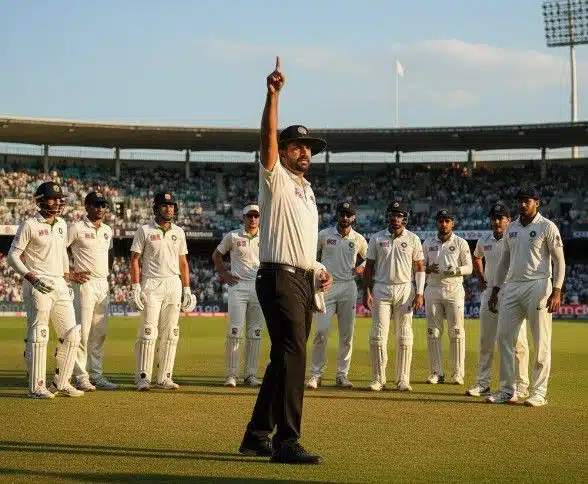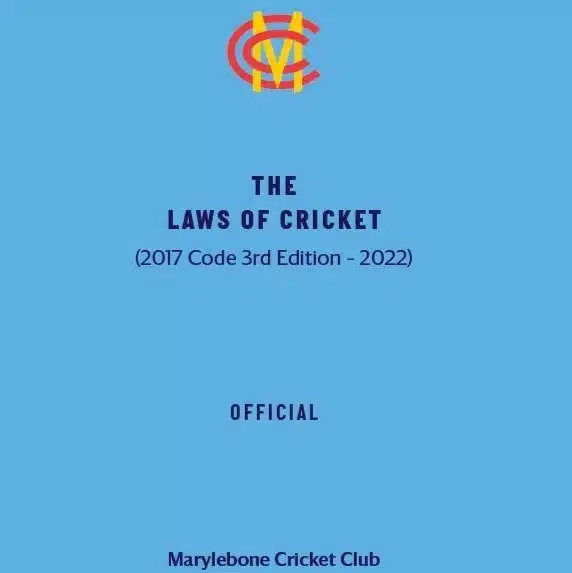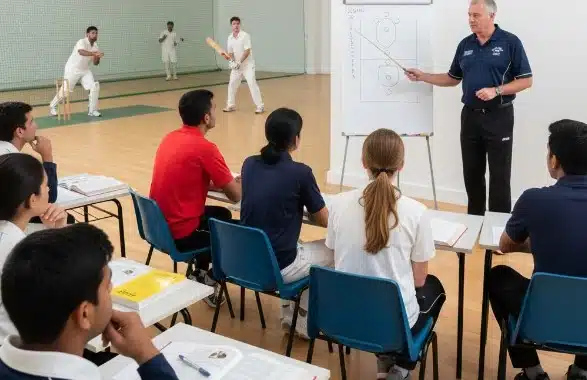Becoming a cricket umpire requires certification from your country’s cricket association. Typically, Level 1 certification consists of the laws of cricket, followed by practical match experience.
The process to become a cricket umpire is straightforward; you must be above 16-18 years old (which depends on your region), and know about cricket.
It involves a written test, training, and gradually building the experience from local matches to higher levels, which is the same regardless of your country.
In this article, we will discuss the eligibility and the step-by-step process to become a certified umpire.
What Does A Cricket Umpire Do?
Cricket umpires play a vital role in every match. They make important on-field decisions based on the 42 Laws of Cricket by the Marylebone Cricket Club (MCC).
Umpires judge dismissals, signal decisions, track runs, manage player conduct, and ensure fair play during the match.
Imagine standing on the pitch, surrounded by players, and all eyes are on you to make the call; well, that’s the power and pressure of a cricket umpire.

Cricket umpires must have skills such as intense concentration, quick decision-making under pressure, good communication, and the ability to stand for long hours.
There are some Great umpires like Simon Taufel, known for his calm precision, and Kumar Dharmasena, once an international player and umpire, who have made their names in the history of cricket.
What Qualifications Do Cricket Umpires Need?
When I first looked into umpiring, I worried whether we needed a degree or years of playing cricket. Well, the truth is you don’t need any. If you really love the game and are eager to learn, that’s already enough to start.
But, before this, specific physical, mental, and educational requirements need to be fulfilled as follows:
1. Educational Requirements For Cricket Umpire
There is no need for a professional degree or academics to become a cricket umpire; anyone above 18 years can apply to the cricket association, though England and Australia accept applicants of 16 years too.
Here is the overview of the Basic Requirements by Country:
| Country | Minimum Age | Governing Body | Entry Level Course |
|---|---|---|---|
| USA | 18 years | USA Cricket | Level 1 Umpire Course |
| India | 18 years | BCCI | BCCI Umpire Course Level 1 |
| England | 16 years | ECB | ECB ACO Level 1 |
| Australia | 16 years | Cricket Australia | CA Umpire Accreditation Level 1 |
Every country’s cricket board has its own standards, but the core principles remain consistent worldwide.
What matters in this field is a strong understanding of how cricket is played and
Knowing the difference between LBW and caught behind decisions is more valuable than any diploma.
Aspiring umpires often start their journey by learning the fundamentals of cricket rules and on-field decision-making. Gaining mentorship under the best cricket umpires can help new students understand real match situations, improve their judgment, and develop the confidence needed to officiate at higher levels. With proper guidance and match experience, students can progress from local games to domestic and eventually international umpiring roles.
2. Essential Skills And Knowledge Required To Become A Cricket Umpire
Mastering the 42 laws of cricket by MCC is your primary responsibility. These laws cover all the rules and regulations, right from pitch dimensions to bowling and batting techniques.
Another important skill beyond memorization is the ability to make critical decisions under pressure in ongoing situations.

Quick reflexes are needed to track fast deliveries; also, good communication skills matter just as much, because you’ll need to manage the dispute between players and maintain authority without being offensive.
3. Physical Fitness Standards for Cricket Umpiring
You’ll need to stand for 6-7 hours during longer matches, sometimes in challenging weather conditions, all while being alert throughout the game.
Good eyesight is important for any umpire, but don’t worry, corrective lenses are also perfectly fine. Quick reflexes are key too, helping you follow the ball and make split-second calls.
At the top levels, the Cricket board even does regular fitness check-ups to make sure the umpire can handle the long hours and fast pace of international matches.
How To Become A Cricket Umpire? A Step-By-Step Guide
If you’re a cricket fan thinking about umpiring, the path is simpler than it sounds. With dedication and patience, you can turn your passion for the game into a career.
Follow these steps to get started:
- Step 1: First, Understand the Laws of Cricket
Study the MCC’s 42 Laws of Cricket online; the basics of cricket focus on dismissals, fielding restrictions, and dead balls.

- Step 2: Find Your Local Cricket Association
You can start by reaching out to your local cricket board, like USA Cricket, ECB, BCCI, or Cricket Australia. They can tell you about upcoming umpiring courses and how to register.

- Step 3: Enroll in an Official Umpire Training Course
Once you know the options, sign up for the Level 1 certification. It can be done in a classroom or online and teaches the rules of cricket and how to manage matches.
- Step 4: Pass the Certification Exam
A score of 75% or higher on the written test and practical is required to get your certificate.
- Step 5: Gain Practical Experience
Start gaining experience with local club matches and gradually progress towards high-end paid opportunities.
Do well at this level, and you might get noticed for national panels or even the ICC elite umpiring list. Most umpires begin at grassroots matches, which is the best way to polish your skills.
How Much Does Cricket Umpire Training Cost?
The cost of Cricket Umpire Training varies depending on the country’s cricket board. Different boards have different programs and their costs associated with them.
Let’s understand the courses offered by each cricket board:
- ECB Umpiring course: It costs around £70, which also includes free ACO membership valued at £30 with ongoing support, match appointments, and liability insurance.
- USA Cricket: $75 for Level 1 certification, which covers the online exam and certificate issuance.
- India (BCCI): You’ll need to contact your state cricket association directly, as pricing varies by region and isn’t publicly listed.
- Australia: Visit the Cricket Australia website for current fees, which are typically AUD 80-120 for entry-level courses, and updated annually.
Additional costs associated with Umpire Training:
- Umpire uniform and equipment: White coat for longer format, dark trousers, appropriate footwear, hat, ball counter, light meter, and notebook, which is approximately $100-200.
- Annual membership fees: Costs around $30-100 for maintaining the certification and insurance coverage that varies by association.
- Match travel expense: In the early volunteer phase, it is self-funded, and it improves with paid opportunities at higher levels.
For the exact pricing and payment, contact your local cricket association directly, as fees are updated annually, and sometimes they may include registration or group discounts.
Free Online Cricket Umpire Course with Certificate
International Cricket Council (ICC) Academy is offering the free “Introduction to Umpiring” certificate course that provides preparation and self-management, knowledge, technique, match management, wellbeing, and safety.
When you complete this course, you will be equipped with an understanding of international cricket standards, terminology, and a certificate of course completion.

USA Cricket also provides the online modules through the state associations, though a paid Level 1 course is required for full certification.
These free courses are not enough to qualify for official match appointments. Still, they will help you to decide if umpiring is right for you before making investments in official certification that is recognised internationally.
Tips to Become a Great Umpire
Excellence in umpiring is achieved with continuous learning and self-awareness, and not just passing certification exams. The following habits make competent umpires truly respected once they reach advanced levels.
- Study constantly: The Laws of Cricket are updated regularly with the MCC clarifications.
- Watch professional umpires: Observe TV umpires’ positioning, management, communication, and decision-making at critical moments.
- Accept feedback: Learning from match assessments and senior umpires to improve decision-making.
- Network: Join umpire associations, meet other officials, and look for mentorship. This will help you get the opportunities.
- Stay neutral: Always be fair, and avoid favoring teams or forming personal connections with players.
- Practice signals regularly: Confidence comes from muscle memory, so repeating them will improve your reflexes.
Develop these habits early in your career, as this will create a strong foundation that serves you throughout your journey.
Simon Taufel once said,
“Good umpires are made through preparation, education, and learning from mistakes – not born.”
-By Simon Taufel, ICC Elite Panel Umpire
This quote reminds us that growth and humility are key, even at the highest levels of cricket officiating.
Also Check:
Conclusion: Become A Cricket Umpire With Prestigious Certification & Practice
Becoming a certified cricket umpire is a rewarding journey for you that starts with formal training and a passion for the sport. With the MCC’s 42 laws as your foundation, you can progress from local league to international grounds.
The process is accessible to anyone with a love for cricket, with a minimum age requirement of 18 years, regardless of background or academics.
Knowledgeable and fair-minded officials are always needed to maintain the integrity of the sport we all love. You can start by contacting your local association to enroll and commit to ongoing learning.
FAQs
Professional cricket umpires earn approximately $3,966 /month, or $23 /hour, though these vary as international umpires have more earnings than domestic cricket.
National cricket association (like USA Cricket, ECB, or BCCI) certification, through knowledge of 42 laws of cricket and match experience, is needed for cricket umpiring.
The cost of Cricket umpiring varies as per your country; typically, it is around $75-120.
Most cricket associations require you to be at least 18, though in England and Australia, 16-year-olds can start entry-level programs.
From signing up to finishing the Level 1 course, it usually takes around 2–3 months. And the time passes quickly once you start learning in the field.







